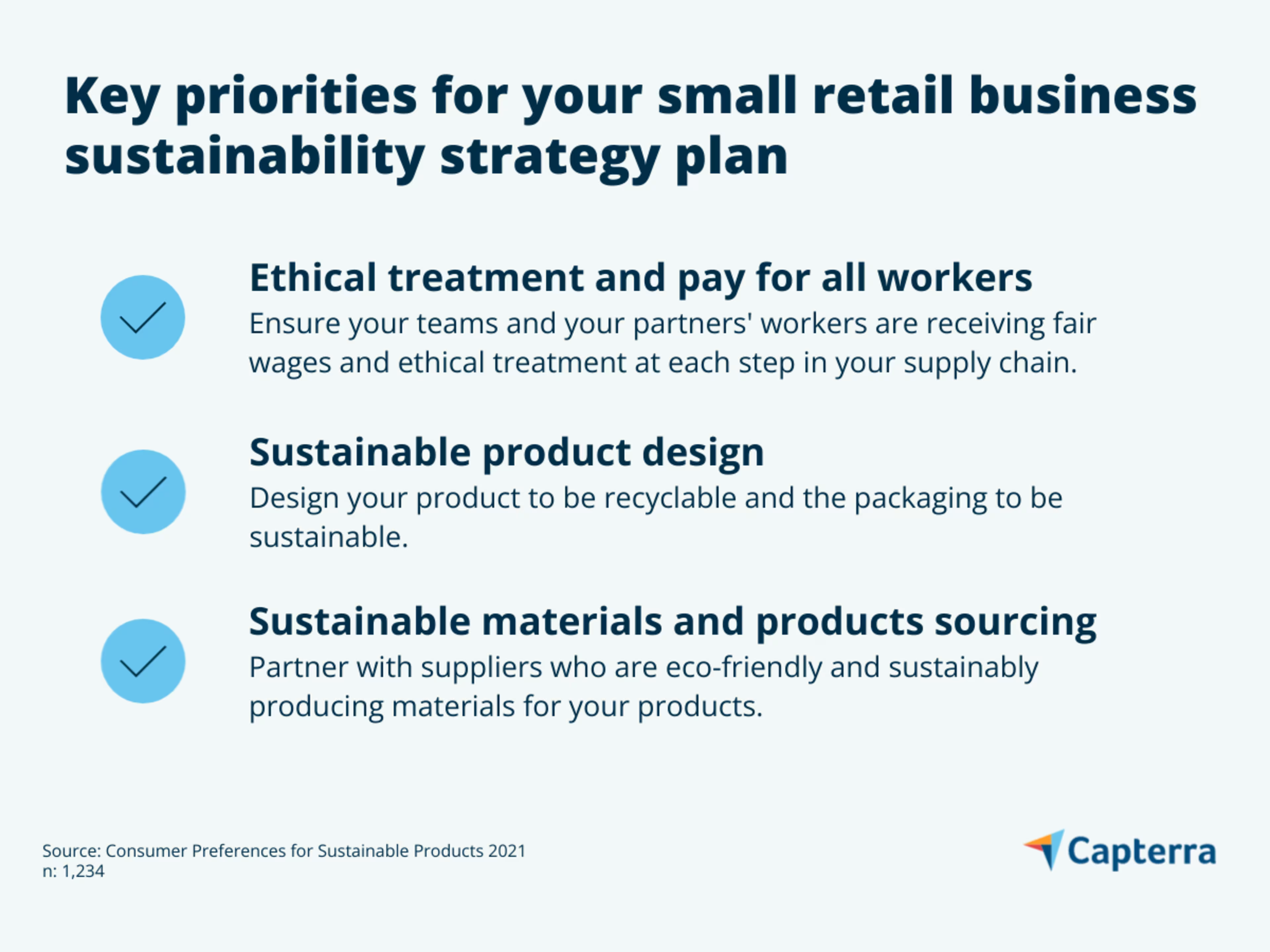We’ll share the sustainability factors consumers want to help inform your product design and production strategy to meet their new demands.
Should your small retail business be making everything locally? Will your customers pay more for sustainable goods? Is sustainability actually important to consumers?
The answers to these questions are not necessarily, most likely, and absolutely. But how do we know this?
In our Consumer Preferences for Sustainable Products* survey, we asked 1,234 consumers about their expectations and preferences for sustainable products. In this report, we’ll provide you with insights based on their responses and share recommendations from our supply chain and retail analysts. This will help you gain more market share by prioritizing the sustainability factors that matter to consumers the most.
We’ve also included some stats and insights from our survey of 564 supply chain leaders, Sustainability in Small Business Supply Chains**, to provide even more insight for you. (You can check out the full report for supply chain leaders here.)
Small business retailers, such as yourself, should use this report to inform your product development and materials procurement strategy as you work to meet consumer demand for sustainability.
What do we mean by a “sustainable product”?
Sustainability encourages businesses to frame decisions in terms of environmental, social, and human impact for long-term rather than short-term gains. Examples of sustainable actions are paying fair wages, supporting social/charity projects, reducing the use of plastic and CO2, and designing environmentally-friendly products.
Ninety-nine percent of consumers are familiar with the concept of sustainability, and 67% have purchased a sustainable product in the past 6 months.
Sustainable packaging and recyclable products are top concerns
Consumers are largely making judgements on the sustainability of a product based on the aspects tangible to them: the packaging, recyclability, and materials. Before making a purchase decision, consumers say that they check the product packaging (43%), product material (42%), ingredients (40%), and if the product is recyclable (35%).
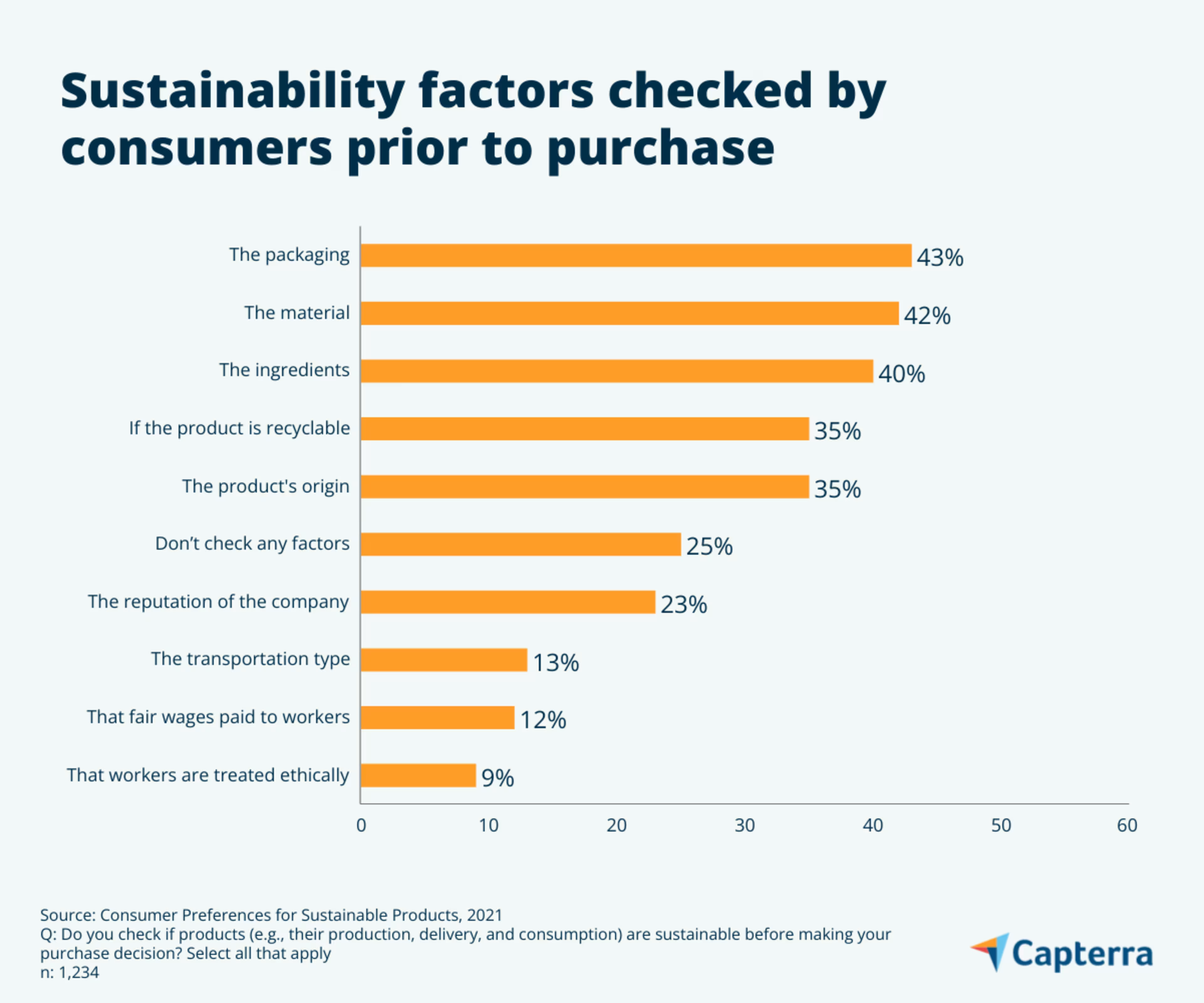
The intangible aspects of sustainability, such as ethical treatment and fair wages paid to workers, are valued by consumers but are not as easy for them to check up on. For example, 65% of consumers think the ethical treatment of workers is moderately to very important, but only 9% actually check for this prior to their purchase decision.
In our Sustainability in Small Business Supply Chains survey, we found that 36% of small to midsize businesses (SMBs) prioritize working with ethical partners (e.g., ones that pay fair wages to workers). So if you’re one of the businesses focused on ethical treatment of workers, be sure to share your commitment with customers in marketing campaigns since you’re ahead in a growing trend.
What can you do?
While redesigning packaging is expensive, sharing your sustainability efforts in your marketing campaigns and on your website typically isn’t. We recommend sharing stories, photos, and short videos of how your products are responsibly made and the green partnerships you have cultivated so customers know that you care about the values they care about.
Consumers are willing to pay more for sustainable products
Sustainability has proven to be the most valuable to consumers in products that are readily consumable and relatively quickly discarded, such as food, clothing, and household products. Each of these types of products made the top of the list of what consumers most value to be sustainable (at 41%, 39%, and 32% respectively). This is opposed to more non-consumable things, such as home improvements (e.g., windows or appliances) or a new home, that ranked near the bottom (17% and 8% respectively).
Only 14% of respondents report not valuing sustainability in any type of product.
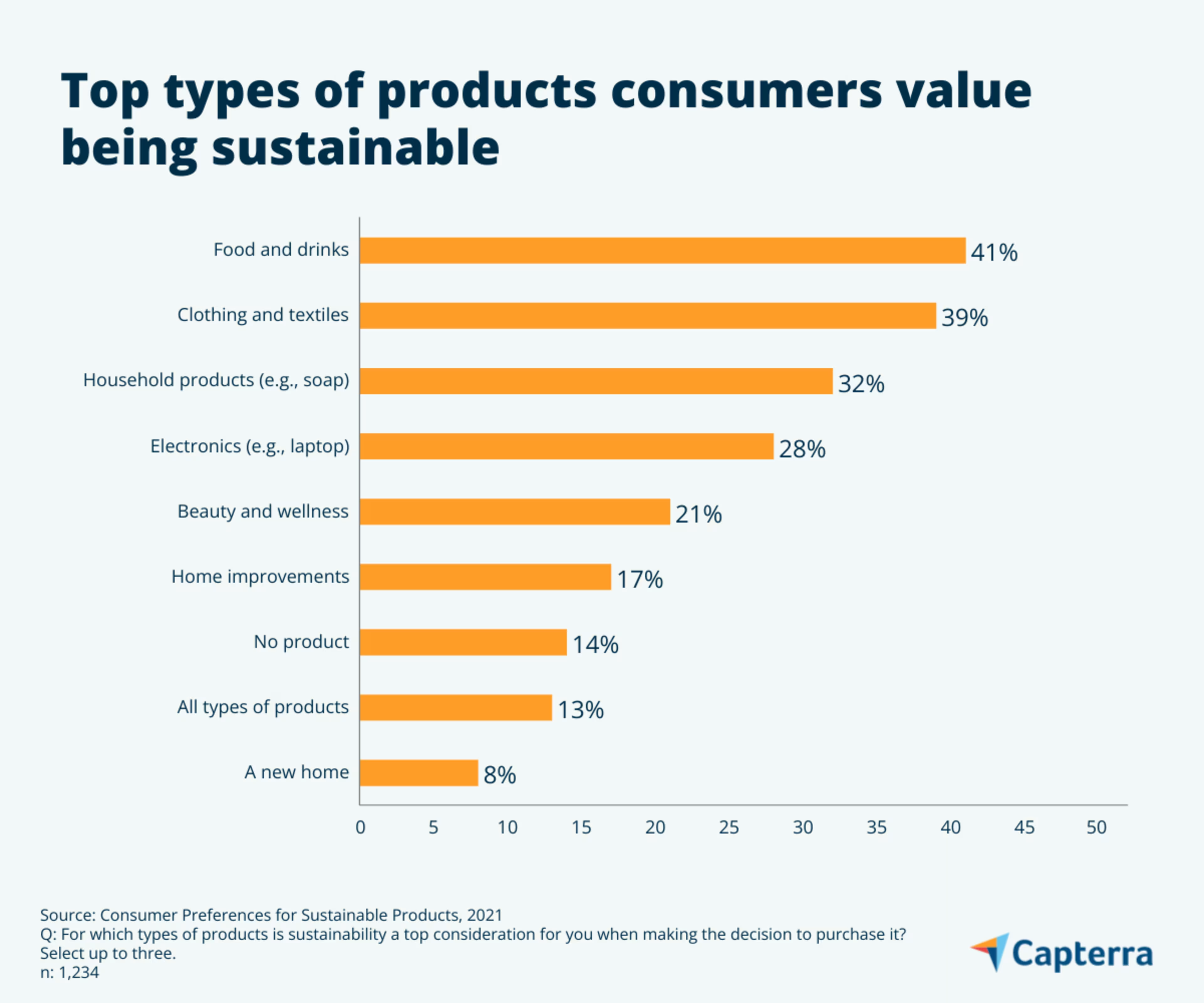
Even though sustainability isn’t a top consideration for products such as electronics (28%) and beauty (21%), consumers are comfortable with their prices when they are sustainable. When asked about the costs of sustainable goods in general, 59% of consumers agree or strongly agree that the purchase price is reasonable.
And in fact, in each of the product categories surveyed, 75% to 80% of consumers say that they’re willing to pay higher prices, ranging from a little more to significantly more, for sustainable products in comparison to unsustainable products.
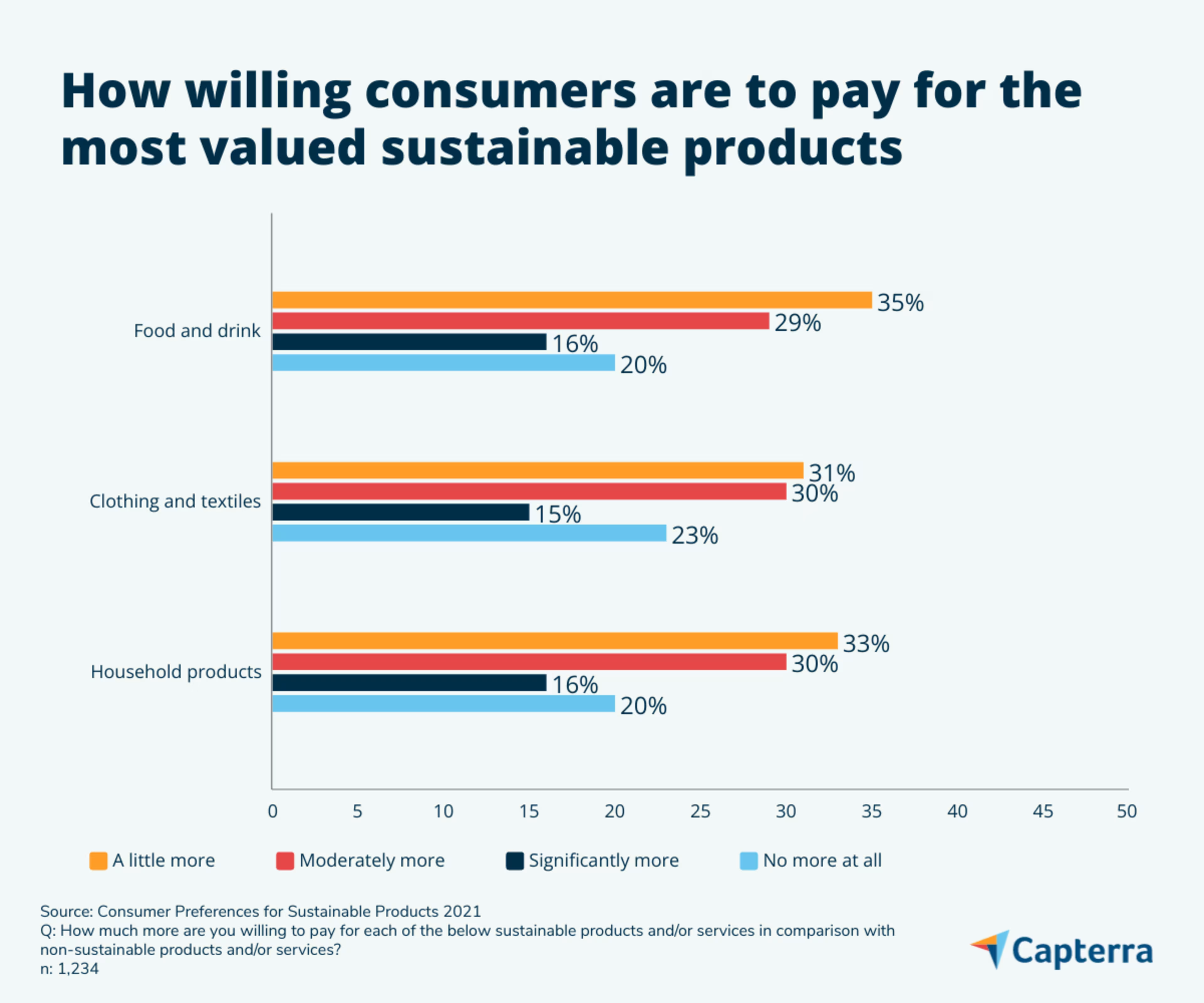
What can you do?
Continuous improvement toward sustainability is valued over lowering prices of your products. Consumers want to know that the product they’re buying from you isn’t harming the planet more than they want to save a few dimes. So continue moving toward a more sustainable product, and be sure to be transparent with consumers as to the journey your company is on to become more sustainable.
What you should prioritize to get the most ROI
To help you design your sustainability strategy, we’ve identified three aspects of sustainability that we think are important to prioritize now based on importance to consumers and cost efficiency.
1. Ensure your workers and your partners’ workers receive fair pay and ethical treatment.
Sixty-five percent of consumers say that workers being treated ethically is moderately to very important to them.
Sixty-four percent of consumers say that workers being paid fair wages is moderately to very important to them.
In our Sustainability in Small Business Supply Chains Survey, only 36% of SMB supply chain leaders report working with ethical partners who pay fair wages to their employees.
2. Design your product to be recyclable and the packaging to be sustainable.
Sixty-five percent of consumers say that a product being recyclable is moderately to very important to them.
The top four sustainability factors that are checked by consumers before purchase is the packaging, the material, the ingredients, and whether the product is recyclable.
Forty-nine percent of SMB supply chain leaders report already designing their products to be sustainable, but only 15% are using the right-size packaging (from our Sustainability in Small Business Supply Chains Survey).
3. Source materials and products sustainably.
Sixty-two percent of consumers report that a product sourced sustainably (e.g., new trees are planted to replace the ones cut down for wood-based products) is moderately to very important to them.
Forty-two percent of consumers check a product’s materials, 40% check the ingredients, and 35% check a product’s origin for sustainability prior to purchase.
Fifty-four percent of SMB supply chain leaders report sourcing from sustainable manufacturers, and 53% work with environmentally-friendly partners (from our Sustainability in Small Business Supply Chains Survey).
Advice from our retail analyst
Bonus advice alert! I teamed up with our retail analyst, Agnes Teh Stubbs, to develop the insights for this report, but I wanted y’all to hear directly from her.
Amplified by social media and media coverage, conscious consumerism has been a growing trend in recent years. Simply providing a good product and prompt service is no longer enough. Increasingly, consumers are seeking out brands and retailers that align with their ethics by taking a stance on issues such as sustainability in order to make a positive impact.
Unsurprisingly, and in response to this shift in consumer sentiment, retailers are finding ways to gain consumer buy-in through transparency and sustainability. Here are a few strategies to earn the trust of your consumers.
Be transparent
Today’s consumer wants to shop and support brands to solve problems. That can only be possible with transparency. Transparency requires that retailers share where their products are from—how it’s made, who makes it, the environment of its workers, and more.
As mentioned before, our Consumer Preferences for Sustainable Products survey found that while as much as 65% of consumers think ethical treatment of workers is moderately to very important, only 9% check for this. You can make it easy for consumers to learn what you’re doing by simply communicating with your customers as to what you’ve achieved. If you have made efforts toward sustainability, consider printing on your packaging how your products are sourced and made. Tell your story, and take your customers on a journey of your achievements and struggles in your ongoing sustainability efforts across all your channels.
Walk the talk
Consumers are no fools. While it now appears to be normal for brands to have a cause mission (a cause that focuses on making social change), you should be conscious of being labeled or perceived as greenwashing or woke-washing.
Greenwashing is when a company claims their products are environmentally friendly under false and deceptive pretenses. For example, luxury fashion brand Coach was called out for deliberately slashing unsold, damaged, or returned goods and dumping them, despite its recent launch of a secondhand sales program and a repair service of its bags.
Woke-washing is when a company outwardly touts social activism, but fails to execute the same practices and standards internally. In a series of social media posts in October 2021, NBA star Enes Kanter accused Nike of slave labor in China and failing to act on injustice in the country where most of its products are made. “Nike remains vocal about injustice here in America, but when it comes to China, Nike remains silent,” said Kanter.
How to avoid hypocrisy pitfalls
Actions speak louder than words. Retailers can practice what they preach and move beyond pledges by managing their own impact as well as promoting and implementing a culture of sustainability internally. Again, communicate what you’re doing to make a positive impact. Advocate for a living wage employee, ensure good working conditions for your employees, and work with suppliers/factories that meet the highest ethical standards.
Sustainability efforts you can de-prioritize for now
We don’t believe in trying to make everything a priority and wouldn’t advise that you try to do so either. And based on the survey results, there are a few aspects of sustainability that you can sideline for now without much fear of losing out. Here are three aspects of sustainability you don’t need to focus an abundance of resources on for at least the next 12 to 18 months:
Made in America
Forty-four percent of those surveyed have no opinion or don’t care if a product they’re looking to buy is made in America. This means if your current sourcing model is internationally-based, the return on investment (ROI) for a product and sourcing overhaul to have your product offering fully made in the States likely isn’t enough to justify it.
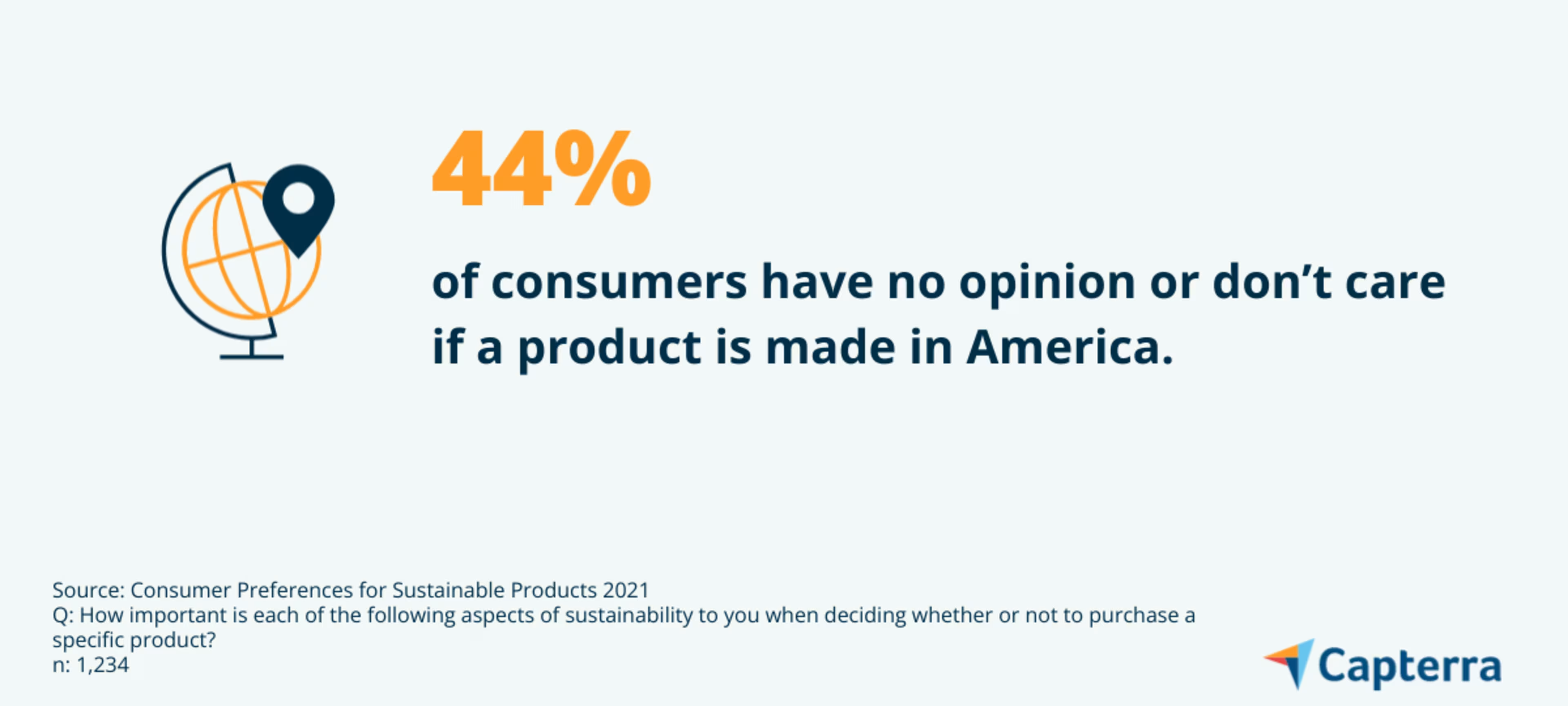
Locally made products
Even more consumers (48%) don’t consider if a product is made locally or not as important in their purchasing decision. And while this doesn’t apply to all food products, the majority of consumables and non-consumables can be sourced from the locations with the best selection and price with little regard for how local it is.
Community outreach efforts
Forty-eight percent of respondents say that a company engaged in community outreach efforts has little to no importance in their decision to purchase a product or not. Now, this is not to say that you should stop any community-enhancing efforts you’re currently making. But the facts show that now is perhaps not the time to go full force with a new community-outreach program in order to gain new customers. Instead, focus on the aspects we discussed earlier.
What about the consumers who aren’t influenced by sustainability factors?
Not everyone is on board with prioritizing sustainably made products. Forty-seven percent of respondents said a company’s sustainable actions have no or minimal influence on their selection of a product. Price is the main reason (39%), with the desire to not have to limit their options of products to purchase coming in second (32%).
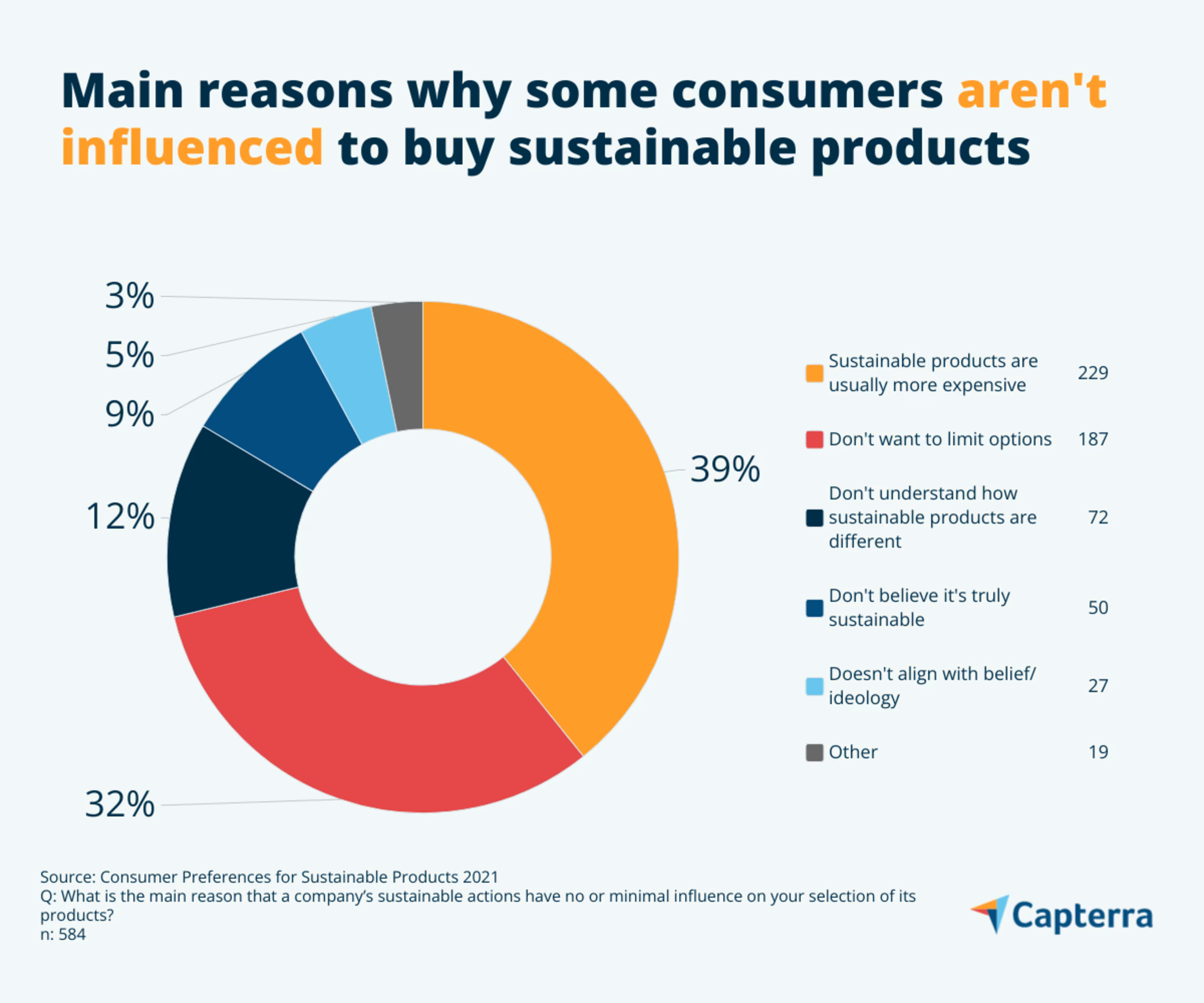
The next reasons each have a root cause of a general sense of skepticism around sustainability. Twelve percent of respondents report not understanding the difference between sustainably-made products and ones that aren’t. Nine percent of consumers report not believing that the product is actually sustainable, while 5% of respondents say that sustainability doesn’t align with their ideology or beliefs.
Skepticism as to the value of sustainable products is still prevalent among consumers and will continue to be a challenge for years to come. Much of this is driven by the many corporations that are continuously found to be untruthful about their sustainability practices as discussed earlier. But with the global push for more clean energy production, and the desire for workers to be treated fairly, this skepticism will continue to decline.
This is all to say that as a small business owner you can only help with public perception in a limited fashion, but you can work to inform your customers and attract new customers by sharing your sustainability efforts in marketing materials.
What can you do?
Highlight the value of your products, and share the sustainable design and/or production you’re using. By doing these things in your marketing campaigns, you can encourage new and perhaps skeptical customers to see value in your product beyond its sustainability factors and strengthen the relationship you have with your current customers.
Take your sustainability journey slow and steady
Now that you’re armed with the knowledge of what sustainability means and how it is valued by consumers, you can design a sustainability strategy that fits your small business. But don’t try to tackle every aspect at once. To help you get started with a focused approach, we made a quick takeaway graphic for you to share with your team as you work together toward not only giving your customers what they want but also making the world a little better.
